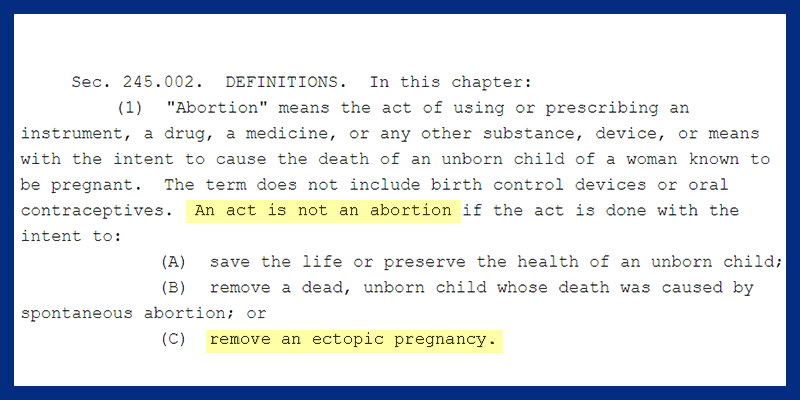Texas’ Pro-Life laws fully allow a woman to receive care when she has an ectopic pregnancy. Still, two Texas women are alleging that they were denied this critical medical treatment, which can be extremely dangerous.
Importantly, ectopic pregnancy treatment is explicitly excluded from the definition of abortion in Texas. This ensures that no Pro-Life law prevents women facing this tragic situation from receiving necessary medical intervention. Still, the Left and liberal media have collaborated to spread confusion about the law, possibly contributing to recent reports of delayed ectopic pregnancy treatment for Kyleigh Thurman and Kelsie Norris-De La Cruz.

Don’t miss important Pro-Life stories like this.
>> Get the Pro-Life Weekly Highlight just once a week:
An ectopic pregnancy is a tragic condition where the embryo implants somewhere other than the uterus, typically the fallopian tube. In some cases, the child may naturally pass away, but if this does not occur, the condition is likely to result in the rupture of the fallopian tube. This event not only ends the child’s life, but creates a life-threatening situation for the mother. Since current medical treatments cannot save both lives in this scenario, it is acceptable under Texas law to save the mother’s life by removing the embryo to prevent further harm. Texas law accounts for this and similar tragic situations, protecting preborn lives without risking the mother’s life.
Specifically, Texas abortion law, as outlined in the Health and Safety Code, explicitly states that ectopic pregnancy treatment is not considered an abortion. This means that any law restricting abortion does not apply in situations where a dangerous ectopic pregnancy exists.

*Texas Health and Safety Code, Chapter 245
The Texas Medical Board recently reaffirmed that Texas’ Pro-Life laws allow for medical intervention when there is a foreseeable threat to the mother’s life or major bodily function, including ectopic pregnancy. The Texas Medical Board rules fully support and clarify that our Pro-Life laws are designed to permit necessary medical intervention as written. Doctors are allowed to intervene to save the life of the mother using “reasonable medical judgment” to analyze the threat. However, some doctors may mistakenly believe they cannot act in these situations, leading to erroneous confusion.
Norris-De La Cruz and Thurman are seeking a federal investigation after allegedly being denied timely medical care for their ectopic pregnancies. Their complaint, filed by the Center for Reproductive Rights—an abortion activist group—argues that two Texas hospitals violated federal law and compromised the women’s future fertility by delaying necessary treatment. Both women are requesting that a federal agency conduct an independent investigation of these hospitals to secure compliance with the Emergency Medical Treatment and Labor Act (EMTALA).
EMTALA ensures that patients, including pregnant women, receive necessary emergency medical care without discrimination, aligning with the commitment to protect all human Life. A previous case brought by the Biden-Harris administration against Texas law was thrown out, demonstrating that Texas Life-saving laws do not violate the Emergency Medical Treatment and Labor Act.
Texas Pro-Life laws are intentionally drafted to ensure that both women and their preborn children receive the care they deserve. We must continue to hold medical providers accountable to provide this care appropriately and combat misinformation that can lead to dangerous delays in treatment.
Thank you for reading this story! If you support our Pro-Life ministry, chip in with a life-saving contribution today!


